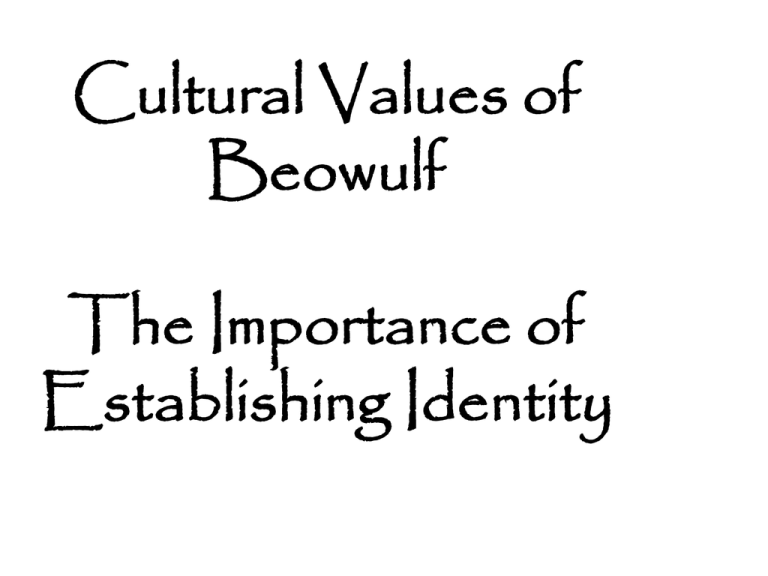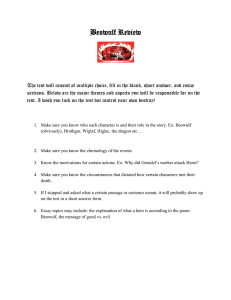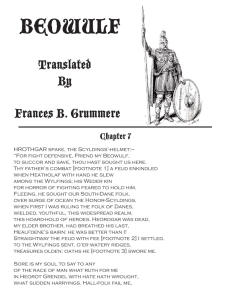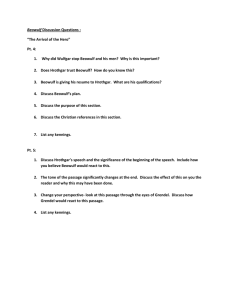Cultural Values of Beowulf The Importance of Establishing Identity
advertisement

Cultural Values of Beowulf The Importance of Establishing Identity As Beowulf is essentially a record of heroic deeds, the concept of identity— •ancestral heritage , and •individual reputation— is clearly central to the poem. The opening passages introduce the reader to a world in which every male figure is known as his father’s son. •family history is prominent •emphasis on kinship bonds Characters take pride in ancestors who have acted valiantly, and they attempt to live up to the same standards as those ancestors. a good reputation is the key to solidifying and augmenting one’s identity. Shield Sheafson, the legendary originator of the Danish royal line, was orphaned; because he was in a sense fatherless, valiant deeds were the only means by which he could construct an identity for himself The Germanic heroic code values: strength courage, loyalty in warriors; hospitality, generosity, political skill in kings; ceremoniousness in women; and good reputation in all people. All of the characters’ moral judgments stem from the code’s mandates. Thus individual actions can be seen only as either conforming to or violating the code. •internal contradictions in values: divided loyalties, situations for which the code offers no practical guidance about how to act. For example, the poet relates that the Danish Hildeburh marries the Frisian king. When, in the war between the Danes and the Frisians, both her Danish brother and her Frisian son are killed, Hildeburh is left doubly grieved. The code is also often in tension with the values of medieval Christianity. While the code maintains that honor is gained during life through deeds, oChristianity asserts that glory lies in the afterlife. oSimilarly, while the warrior culture dictates that it is always better to retaliate than to mourn, Christian doctrine advocates a peaceful, forgiving attitude toward one’s enemies. The Difference Between a Good Warrior and a Good King Over the course of the poem, Beowulf matures from a valiant combatant into a wise leader. His transition demonstrates that a differing set of values accompanies each of his two roles. The difference between these two sets of values manifests itself early on in the outlooks of Beowulf and King Hrothgar. •Whereas the youthful Beowulf, having nothing to lose, desires personal glory, •the aged Hrothgar, having much to lose, seeks protection for his people. Though these two outlooks are somewhat oppositional, each character acts as society dictates he should given his particular role in society. •The heroic code requires that a king reward the loyal service of his warriors with gifts and praise •It also holds that he must provide them with protection and the sanctuary of a lavish meadhall. Hrothgar’s speeches, in particular, emphasize the value of creating stability in a precarious and chaotic world He also speaks at length about the king’s role in diplomacy, both with his own warriors and with other tribes. Monsters •In Christian medieval culture, monster was the word that referred to birth defects, which were always understood as an ominous sign from God—a sign of transgression or of bad things to come. •In keeping with this idea, the monsters that Beowulf must fight in this Old English poem shape the poem’s plot and seem to represent an inhuman or alien presence in society that must be exorcised for the society’s safety. They are all outsiders, existing beyond the boundaries of human realms. Grendel’s and his mother’s encroachment upon human society—they wreak havoc in Heorot—forces Beowulf to kill the two beasts for order to be restored. •To many readers, the three monsters that Beowulf slays all seem to have a symbolic or allegorical meaning. since Grendel is descended from the biblical figure Cain, who slew his own brother, Grendel often has been understood to represent the evil in Scandinavian society of marauding and killing others. A traditional figure of medieval folklore and a common Christian symbol of sin, the dragon may represent an external malice that must be conquered to prove a hero’s goodness. Because Beowulf’s encounter with the dragon ends in mutual destruction, the dragon may also be interpreted as a symbolic representation of the inevitable encounter with death itself. The Oral Tradition Intimately connected to the theme of the importance of establishing one’s identity is the oral tradition, which •preserves the lessons and lineages of the past •helps to spread reputations. •only the spoken word can allow individuals to learn about others and make their own stories known. •the prevalence of bards’ tales (such as the Heorot scop’s relating of the Finnsburg episode) •and warriors’ boastings (such as Beowulf’s telling of the Breca story). The Mead-Hall •Hrothgar’s great hall of Heorot, in Denmark, and •Hygelac’s hall in Geatland • provide light and warmth, food and drink, and singing and revelry •safe haven for warriors •place of community, •where traditions were preserved, loyalty was rewarded •stories were told and • reputations were spread. Cultural Values of the... •The American west featured all sorts of people from •pioneers and scouts to • lawmen, outlaws, • gangs and •gunfighters (gunslingers), •to the American cowboy, and •legendary pioneering women on the frontier. •the life of the cowboy who spent up to four straight months in the saddle, often in the same clothes every day. •He ate every meal at the chuck wagon, drinking nothing but coffee and water. At night, if a storm came and the cattle started running, it was the cowboy's job to jump on his horse to head off the cattle and round them up safely. •A Western saloon is a kind of bar particular to the Old West. •Saloons served such customers as fur trappers, cowboys, soldiers, gold prospectors and miners and gamblers. •By way of entertainment, saloons offered dancing girls. Many saloons offered poker, brag, three-card monte, and dice games. • Other games were added as saloons continued to thrive and face growing competition. These added games included billiards, darts. •Some saloons even incorporated piano players and theatrical skits •outlaws of the old west •packed their six shooters and rifles to rob banks, stagecoaches and trains, •modern day outlaws are a more inventive lot •Oftentimes, these bandits resort to defrauding innocent folk and use blackmail and extortion instead of revolvers, although, some have certainly been known to use guns too http://www.youtube.com/watch?v=qpiSPoUqL8k Wild Wild West, Jim West, desperado, rough rider No you don't want nada None of this, six gun in this, brotha runnin this, Buffalo soldier, look it's like I told ya Any damsel that's in distress Be out of that dress when she meet Jim West Rough neck so go check the law and abide Watch your step with flex and get a hold in your side Swallow your pride, don't let your lip react, You don't wanna see my hand where my hip be at, With all of this, from the start of this, Runnin the game, James West tamin the west so remember the name Now who ya gonna call?






